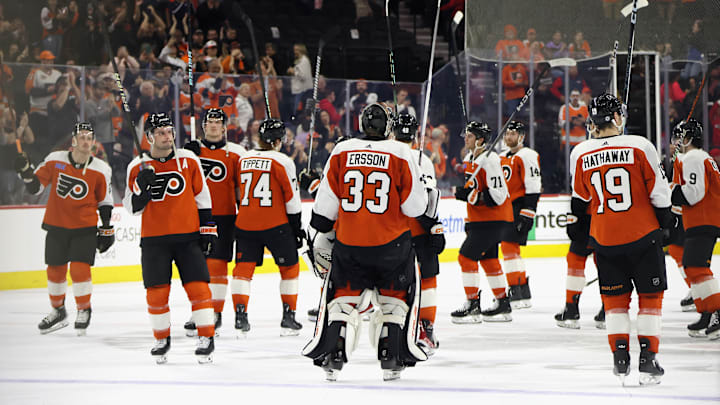The 2023-24 Philadelphia Flyers are cold in the ground, and there is plenty to dissect before turning an eye toward what is sure to be an eventful offseason in advance of their next NHL campaign.
Feelings are mixed about this past season, as the team certainly overachieved and gave their fans something to be interested in until (almost) the final buzzer. Yet it still feels disappointing on one level because of how the Flyers let a playoff spot slip out of their grasp in the season's final weeks. Their 8-game losing streak at the worst possible time to mostly inferior competition was too much to overcome, and it was largely punctuated by shoddy team defense and subpar goaltending from a completely worn-out Sam Ersson.
Yes, the 8-game skid is what ostensibly killed their playoff aspirations, but the real overarching blame can be laid at the feet of a season-long phenomenon: the team's abysmal power play. The Flyers finished at a cataclysmic 12.2%, the worst mark in team history and last in the league by a vast margin this season. Their 31 power-play goals were also the fewest in the league. Let's run down some very depressing statistics:
- Seven teams scored more than twice as many power-play goals as the Flyers this season, and six teams finished with an efficiency more than 100% higher than the Flyers' 12.2% clip.
- Owen Tippett's five power-play goals led the team, but he did not crack the top 100 league-wide in PPG.
- Florida's Sam Reinhart led the league with 27 PPG. Remember, the Flyers as a team had 31.
- The Flyers did not score on their final 24 power plays of the season.
- Morgan Frost was seventh in average time on ice by Flyers forwards this season, but he was one of the few players put in a position to succeed on the power play, as he somehow led the team with 11 power-play points. This still put him outside the top 160 PPP scorers in the league.
The Philadelphia Flyers have finished with the worst power play for three straight seasons, a National Hockey League record.
— Dylan H. Robillard (@DylanRobillard_) April 17, 2024
2021-22: 12.6% Power Play Percentage
2022-23: 15.6%
2023-24: 12.3% #LetsGoFlyers
On an actual bright note, the Flyers still ended up a net positive on special teams, thanks to the fourth-best penalty kill in the league AND a league-high 16 short-handed goals. But imagine how much they would have benefitted from an even decent power play.
Add it all up, and it makes sense. Looking at the Flyers' personnel available for power plays, they had one of the least potent offensive units in the league. They've never been able to replace Claude Giroux's playmaking ability from the bumper position, the net front PP presence of Wayne Simmonds, or the offensive acumen of a Shayne Gostisbehere to quarterback a man-advantage. Maybe some of those pieces are here and can grow into those roles (Tyson Foerster, Jamie Drysdale, etc.). And perhaps help is on the way internally from Massimo Rizzo and others. Eventually, of course, Matvei Michkov is expected to be the catalyst. But in the here and now, the unit simply stinks. So, what can be done?
First, even though assistant coach Rocky Thompson was lauded for some of his work this year, he can no longer be the man in charge of the power play. It was lifeless all year, and new ideas and a new system must be put into place. Thompson can probably still stick around, but duties must shift. Results aren't likely to skyrocket, not with the Flyers' current crop of players, but year-over-year growth from some of the young crowd could help at least get it to the middle of the pack. Maybe the Flyers splurge on a veteran this offseason to jumpstart their moribund power play, but you can be sure that Danny Briere will be judicious about such moves, given that he is likely to get out from under a few veteran contracts in the coming months. Regardless of the approach, the PP won't be an easy fix, so we'll see how things play out next year. It can't be any worse. I think.
All told Flyers fans had a lot to be proud of this season, and it's a shame that the team made it this far only to be denied a playoff spot in their final game. There were stumbles along the way, but the main theme of the 2023-2024 Philadelphia Flyers was their inability to make opponents pay for putting them on the power play. It cost them dearly, and it must improve next year if the Flyers want to move up from the proverbial "mushy middle" of the NHL standings.
